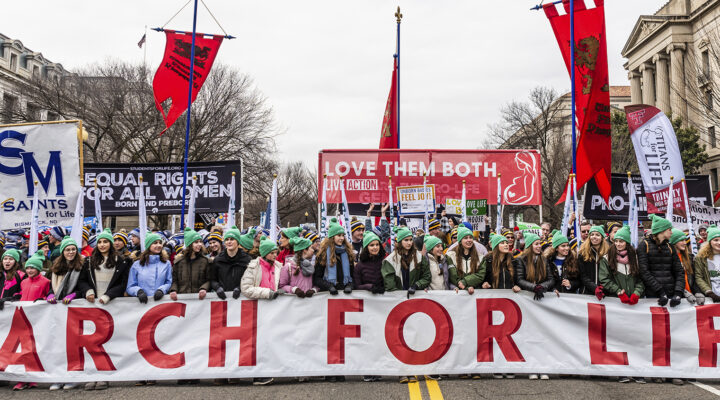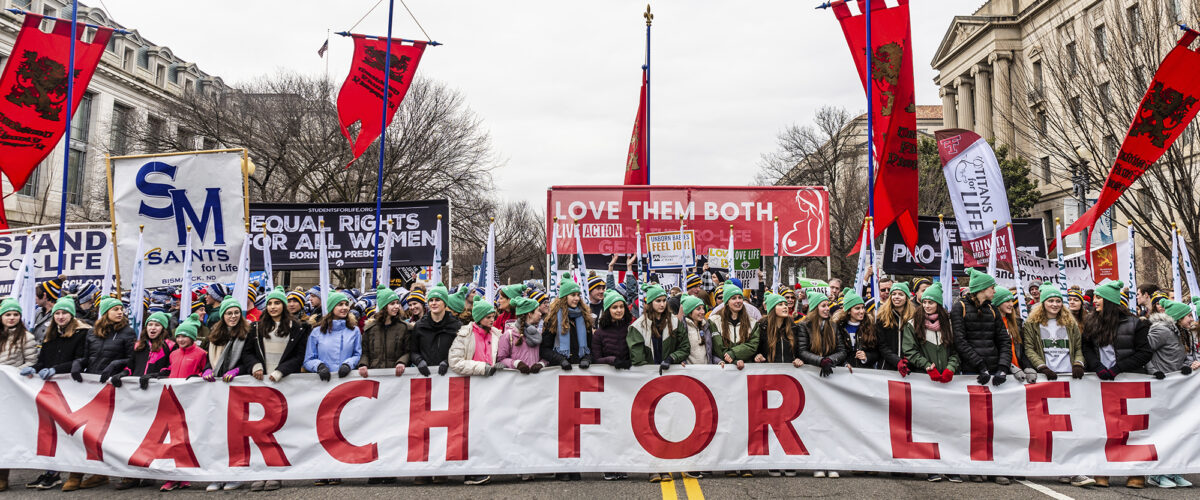When the National Public Radio program “Consider This” wanted to know about evangelical Christian response to the impending evisceration of Roe v. Wade, they turned to one of the most prominent evangelical scholars on history and gender, Kristin Kobes Du Mez.
Du Mez, author of the bestselling book Jesus and John Wayne, teaches at Calvin College in Michigan. She identifies as an evangelical herself but also has gained both notoriety and scorn for her descriptions of how gender issues intersect evangelical beliefs and politics.
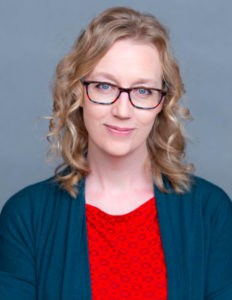
Kristin Kobes Du Mez
In less than 1,000 spoken words, Du Mez summarized the history of evangelical concern about abortion and what she’s been hearing about the leaked U.S Supreme Court decision that is likely to throw laws about abortion back to the states. Her entire conversation with “Consider This” host Michel Martin may be heard here.
A relatively new concern
In the interview broadcast May 7, Du Mez said what other scholars on evangelicalism have been saying: Evangelical opposition to abortion is a relatively new concern, and its roots are in politics more than theology.
“It is surprising to go back in time — and not that long ago — where there was certainly more of a spectrum of views on abortion. Now, I do want to emphasize that there’s a long history of anti-abortion sentiment in evangelical spaces and in Christian tradition, so it would be wrong to say that evangelicals or that historical Christians were not certainly troubled over the issue of abortion,” she said. “But in the late 1960s, we have this remarkable issue of Christianity Today, the flagship magazine of American evangelicalism, discussing this question of abortion. And the conclusion is that it’s a very complicated moral issue. And yes, the Southern Baptist Convention comes out in favor of opening up access to abortion in many cases in 1971, and then they reaffirmed that in 1974 and in 1976 — so after Roe v. Wade.
“The Southern Baptist Convention comes out in favor of opening up access to abortion in many cases in 1971, and then they reaffirmed that in 1974 and in 1976 — so after Roe v. Wade.”
But in the 1970s, after the Roe v. Wade ruling, there was a spike in the number of abortions being performed in the United States. “And that causes many Americans, not just evangelicals, to kind of rethink, ‘Is this what we wanted?’ But I think, more importantly, you have the rise of second wave feminism and, in conservative white evangelical spaces, a real backlash against feminism. And over the course of that decade, abortion becomes linked to feminism.”
That linkage is part of the shift in evangelical attitudes, Du Mez explained. “From 1979 on, that’s when you see a real kind of shrinking of space within conservative evangelicalism to have any view on abortion that isn’t strictly and staunchly pro-life; life begins at conception.
Why the inconsistency?
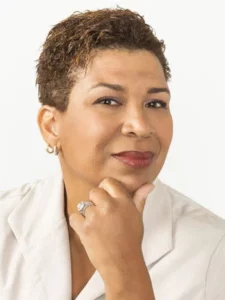
Michel Martin
Martin quizzed Du Mez on the inconsistency evangelicals appear to have shown toward other seemingly “prof-life” causes such as access to health care. The host said: “One would think that if you adopt a perspective that values and reveres the sanctity of life, then it would be across the life spectrum. … Just the question of keeping women alive during and after childbirth would seem to be something that would have equal weight, but it doesn’t.”
Du Mez agreed that is, indeed, the case. However, “there is a minority of evangelicals — of white evangelicals — who do embrace this holistic life commitment, including the death penalty and pro-gun legislation and pro-health care, universal health care,” she explained. “But that is a definite minority.”
The reason for this seeming disconnect, the professor said, is because the white evangelical moral system “is one that really embraces an individualistic ethos or ethic.”
“The white evangelical moral system ‘is one that really embraces an individualistic ethos or ethic.’”
Protecting the life of an unborn human is perceived to be a “clear-cut case” of protecting “an innocent life,” she said. But when considering the death penalty or even universal health care, many white evangelicals see inequities as the result of poor personal choices.
“Well, if you had been more responsible, if you had higher income, if you — you know, there are things you could have done here — whereas abortion, it seems very simple or even simplistic.”
Gender ideals
But that’s not the only driver in this scenario, Du Mez told Martin. “We need to understand how abortion is also situated in terms of evangelical gender ideals. And for evangelicals, conservative evangelicals, gender difference is really foundational to their understanding of the social order. And they believe that God created men and women to be very different, even opposites. And the women’s primary calling is that of wife and mother. And so abortion also really severs that kind of biological or social relationship, or threatens to do so. And for that reason also, abortion is such a priority for evangelicals because it kind of strikes at the heart of their understanding of women and men and their understanding of how God has ordered society.”
Mother’s Day in Houston
That was indeed the case at one of the largest Baptist congregations in America the next day, Mother’s Day, as Houston pastor Ed Young recognized all mothers in the congregation, asking them to stand while he commended them and called them “the highest realm of blessing to all the world.”
Then Young, pastor of Second Baptist Church and a former president of the Southern Baptist Convention, turned to a sermon from the book of Exodus, where the Bible says “there arose a new king of Egypt who knew not Joseph” and who ordered all the male children of the Hebrews to be killed at birth.
In a folksy and fiery 50-minute sermon, Young turned the story of the murderous rage of Pharoah into a modern telling of abortion in America.
Young turned the story of the murderous rage of Pharoah into a modern telling of abortion in America.
“We look at ancient Egypt and say what a horrible place that was. Infanticide. … Egypt was a sane and sensible land, ladies and gentlemen, compared to the United States of America. Since 1973 Roe v. Wade was passed, in America we have seen through abortion — which clearly defined is a child’s murder in the womb of the mother — … 63 million children have been killed in the place where they should be safer than any other place throughout their life.”
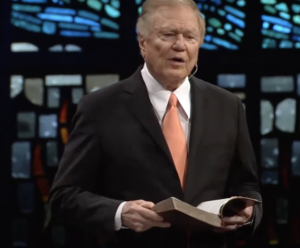 He added: “Of all the people who are being slaughtered in Afghanistan, all the people who are now being slaughtered in war, take all this number and all those who are the victim of genocide in Nazi Germany, Adolf Hitler, all the people Josef Stalin murdered, all the people that Mao in China murdered through genocide and add them to everything that’s happening in Ukraine today — that 63 million that we have legally murdered in the mother’s womb is a greater number than all of them together.”
He added: “Of all the people who are being slaughtered in Afghanistan, all the people who are now being slaughtered in war, take all this number and all those who are the victim of genocide in Nazi Germany, Adolf Hitler, all the people Josef Stalin murdered, all the people that Mao in China murdered through genocide and add them to everything that’s happening in Ukraine today — that 63 million that we have legally murdered in the mother’s womb is a greater number than all of them together.”
Fact-checking
In reality, the statistics paint a more complicated picture than Young implied. While it is estimated by the National Right to Life Committee that 63 million abortions have been done since 1973, the rate of abortions per capita has been declining since 1990 and today’s rates are lower than they were in 1973.
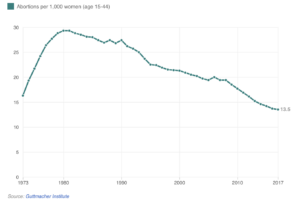 In 2019, there were 11.4 reported abortions per 1,000 women ages 15 to 44, compared with 16.3 per 1,000 women in 1973. That means proportionate to population, there will be fewer abortions performed in America this year than were done in 1973.
In 2019, there were 11.4 reported abortions per 1,000 women ages 15 to 44, compared with 16.3 per 1,000 women in 1973. That means proportionate to population, there will be fewer abortions performed in America this year than were done in 1973.
Seeing abortion as genocide against Blacks
Young referenced the leak of the draft majority opinion of the Supreme Court and said he is “thrilled and pray that will become a reality.”
Roe v. Wade was “crazy judgment by the court” that has no standing with the U.S. Constitution, the pastor declared.
Worse, he continued, the prevalence of abortion in America has created a new kind of racism and genocide that has targeted African Americans.
Out of the estimated 63 million abortions since 1973, Young said 40% (19 million) “have been African American children in the mother’s womb. There has been a hidden racism operating in America to suppress a whole racial group of people. And it has been carried out under the banner of civil rights.”
“There has been a hidden racism operating in America to suppress a whole racial group of people. And it has been carried out under the banner of civil rights.”
He then compared this to the Supreme Court’s 1857 Dred Scott ruling that “instituted slavery as a legal stance in America. They said to those slave owners, you can do anything you want to with that which you own. It’s the same godless argument you hear today that women make today: You can do anything you want to with that life that is within in. Ladies and gentlemen, let me remind you of something: Life is sacred and belongs to God, and when conception takes place, it is no longer under our auspices.”
Young told his congregation that Planned Parenthood has roots in eugenics and attempts to suppress a group of people, preying on minority communities.
“The hidden racism since 1973 in America … is a tragedy and a sin against God and it is on the conscience of our nation. … In the light of where we are I don’t believe Germany would have voted to exterminate those Jews … but in America we have done it legally under our law. … The great tragedy is that we think we can vote and decide about life,” he declared.
Related articles:
Why I’m a pro-choice Christian and believe you should be too | Opinion by Laura Ellis
Alito and public opinion reveal the link between Roe and a broader white Christian nationalist agenda | Opinion by Robert P. Jones
SBC calls for ‘immediate abolition of abortion without exception or compromise’
A leak: The truth of a sick nation | Opinion by Jamar A. Boyd II
To reduce abortion humanely and justly, people of faith should back the ERA | Opinion by Allyson Mckinney Timm and Meghan Tschanz
Racism and the evolution of Protestant support for private education | Analysis by Andrew Gardner

